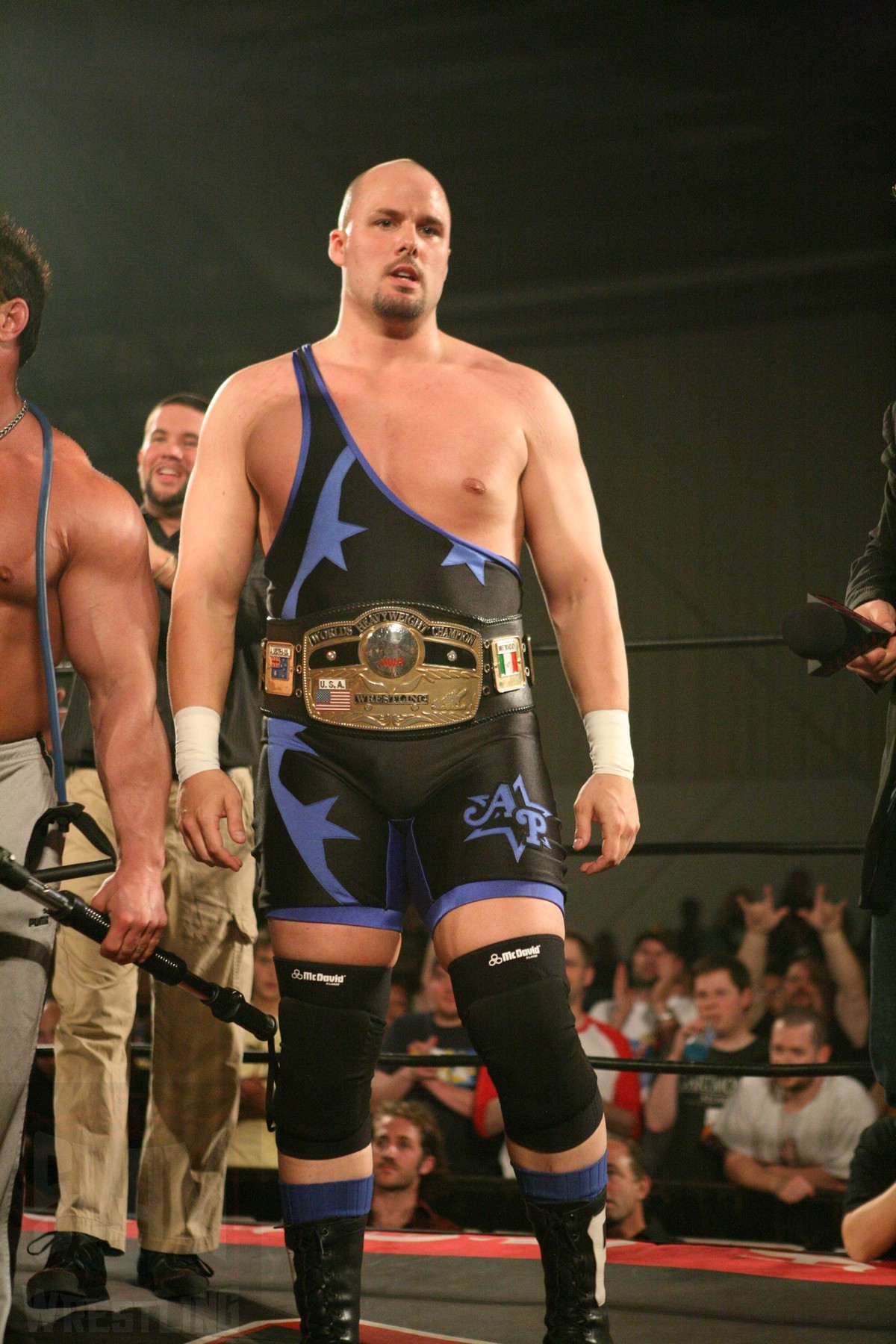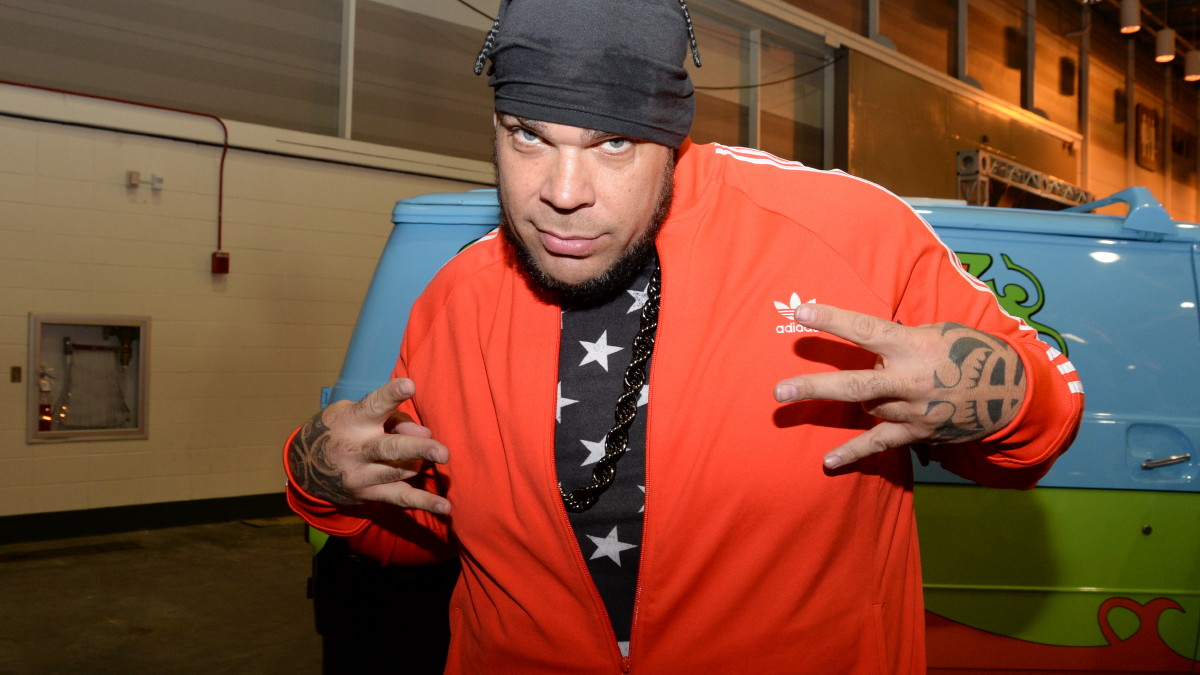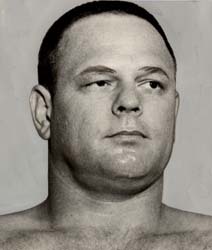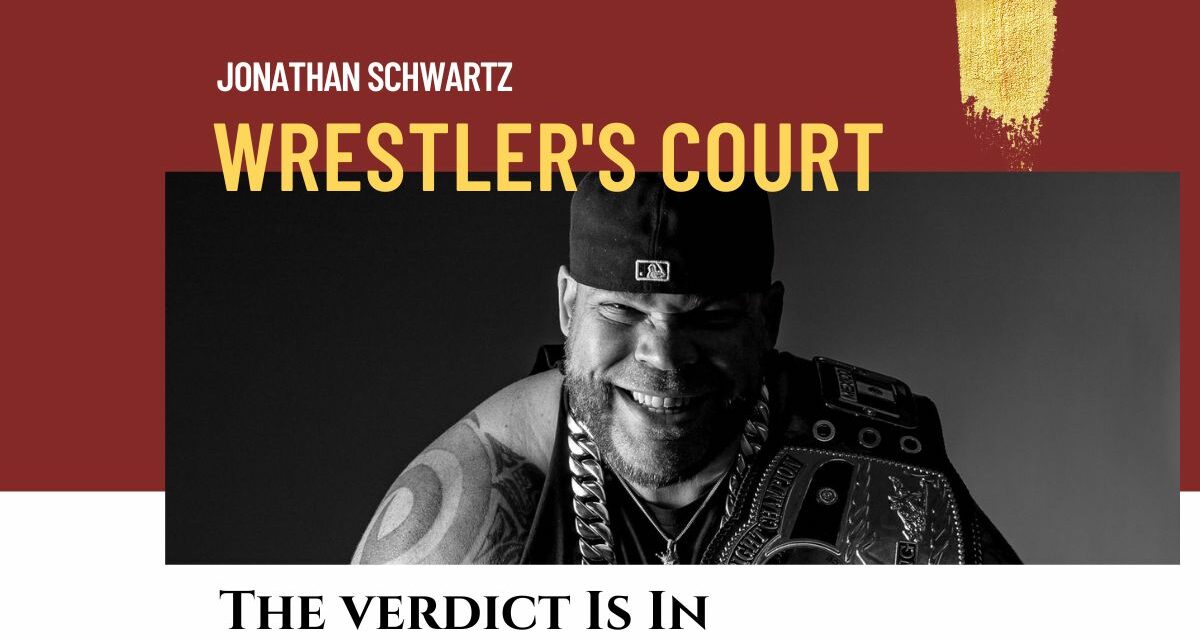On November 12 at the Hard Times 3 pay-per-view show, former Funkasaurus and current FOX flunkie Tyrus won the National Wrestling Alliance (NWA) World Heavyweight championship. Tyrus won the title in a three-way match, beating champion Trevor Murdoch and Matt Cardona, who had also recently held that title — and beaten Murdoch — only to have surrendered it due to injury. Tyrus won after Murdoch had knocked Cardona out with a DDT on the floor outside the ring, whereupon Tyrus locked the champ in a Tongan death grip and chokeslammed his way to wrestling immortality. *cough*
In a year full of major wrestling stories, this would be a blip but for a few factors: the near universal “WTF” reaction occasioned by the title change; the fact that the new champ is best known for his appearance on third tier cable news and for swivelling his hips alongside the Funkadactyls and Sweet T Lord Tensai before Xavier Woods bogarted his gimmick; and the sense that the NWA, which was once pro wrestling’s premier sanctioning body/anticompetitive combine has somehow diminished itself by appointing Tyrus champion.
Before we get into the merits of Tyus as champion, let’s do a bit of level setting when it comes to the NWA and its vestigial prestige. The NWA claims a lineage going back to the turn of the last century but was officially founded in 1948. While it linked to promotions and provided its touring champions to member promotions across the US, Canada and abroad, its power was always concentrated wherever the strongest regional promoters operated, often in the US heartland.
The NWA began as a sanctioning body for independent promotions back when kayfabe was respected. The promotions owners comprised its board of directors, who effectively carved North America into what we know as the territory system. The NWA sanctioned championships throughout its network, recognized a single world champion (who would be decided by the Board members in well in advance, unless injuries or accidents happened), exchanged talent and generally stifled competition from promoters outside the Alliance.
Until the 1960s, the NWA was pro wrestling’s unchallenged governing body and a fun application of dodgy corporate governance. Eventually large territories like the WWWF and AWA left, and by the 1980s most of the NWA’s members had been driven out of business by the then WWF’s national expansion (more on that later).
The original NWA effectively died in 1993, when World Championship Wrestling (WCW) left. It would continue to shop around its version of the world championship to the tattered US independent scene until 2002, when Jeff Jarrett’s Total Nonstop Action (TNA, later Impact) provided a home for the NWA name until 2007. In August 2012 the NWA changed its business model from a membership-based one (which makes sense since independent promoters who had trouble making payroll after shows likely didn’t have money for Alliance dues) to a licensing model. In 2017, it was purchased by Billy Corgan with a view to operating as a standalone promotion with its own roster of stars. Including Tyrus.
Corgan’s NWA has the belts and the intellectual property and a claim to the history of the original organization, but it is a completely different entity. It may help to think of it as an independent promotion in its own right, but one with slightly more notoriety, a more visible YouTube channel, and an incrementally larger budget and name recognition that belies all of this.
I’ll admit up front that while I read his interviews, I haven’t watched much of Billy Corgan’s NWA. Naming Tyrus as his new world’s champion isn’t likely to change that. In fact, it’s pretty much a lock that I won’t be tuning in for reasons I will set out below. Corgan’s decision does mean that I, like many in the pro wrestling commentariat, will be spilling a bit of ink on the subject — and if Corgan’s goal is to generate any kind of publicity bump, he gets his way today. But as far as I’m concerned, this is a Black Friday style one-day only occurrence. Even in the minutia-focused world of wrestling fandom, this is not a major story. It’s a booking decision, and probably not a long-term one.

NWA World champion Adam Pearce in Ring of Honor. Photo by George Tahinos, georgetahinos.smugmug.com
Given Tyrus’ record as a pro wrestler and his performance in his title victory, it’s safe to say that if he were alive today Harley Race would not be impressed. Admittedly a cursory scan of the NWA’s roster looks thin; thinner with the departure of Nick Aldis, who capably carried the company through much of its first few years under Corgan. During its years in the wilderness the NWA was kept alive by wrestlers like Jax Dane, Rob Conway, current WWE mouthpiece Adam Pearce and Dan Severn (Hi, Colt Cabana!).
Thankfully, there are many places for wrestlers to ply their trade these days — although we do appear to be entering a period of consolidation as the economy tanks in general. WWE likely has the deepest pockets, with AEW relatively close behind. Impact can leverage a strong roster on a smaller budget due to creative contracts, a liberal intellectual property policy and partnerships (maybe more) with other organizations like AAA, AEW and NJPW. Billy Corgan has been open about the challenges of acquiring and keeping talent under these conditions, especially after launching shortly before COVID only to have AEW change the landscape in the meantime.
The NWA’s roster includes some newer, younger talent but is heavy on former Impact and WWE wrestlers who put in the time but were never used to their potential: Crimson, Aron “Damien Sandow” Stevens, Caprice Coleman, Chris “Masters” Adonis, Da “Elijah Burke” Pope, Dirty “Fan” Dango, Doug Williams, Fred “Darren Young” Rosser, Harry Smith, Jay Bradley and JTG, in addition to Tyrus, Cardona and Murdoch. They have all had runs elsewhere and I’d argue that most of them were underappreciated and underused, and that time spent in those bigger promotions made them less than household names. Some, like JTG, Stevens, Dango or Cardona managed to get over with audiences despite their employer’s lack of interest but all were ultimately relegated to enhancement status before being future endeavored, in some cases almost a decade ago.
Most of these wrestlers would have made excellent reclamation projects upon their release. Give them the chance to reinvent themselves on the independent scene and take advantage of their ‘big time’ experience to recast themselves more serious performers on their way back to the dance. It’s worked for some. Bobby Lashley and Drew McIntyre leveraged their first, mediocre WWE runs into prime positions in TNA and elsewhere and have turned their experiences into much bigger second acts. John Morrison collected belts in Impact and Lucha Underground. His second WWE run was uninspiring but he continues to work at a high level, and it wouldn’t be surprising to see him pop up anywhere and put on a great show. I’ve written before about how Cody Rhodes reinvented himself after his time as Stardust — including an NWA World title run.
So, it’s possible to leave and reinvent yourself and come back stronger. Pro wrestling loves these kinds of stories, so much so that Sting, Rob Van Dam, Jeff Hardy and Hulk Hogan have won multiple Pro Wrestling Illustrated Comeback of the Year Awards. But respectfully, with the exception of Cardona, who turned his release from WWE into a wellspring of creativity that made his brief NWA World championship run mean something to him as a performer and to that title, I just haven’t seen a successful enough reinvention to make most of these talents credible world title contenders. But at least they look the part and can wrestle a full match without getting winded.
If Mr. Corgan was really looking to take the promotion in a different direction, he could have looked to former ROH champion Davey Richards, Dak Draper or EC3 — another WWE release who successfully reinvented himself, only to be rendered invisible again when he returned to the federation… and who now battles long odds to promote his “Control Your Narrative” brand despite quick defections by Braun Strowman and Karrion Kross.
I try to see the good in most of wrestling and think how a smart booker makes anything work; arguably, Tyrus brings in his own audience and is not ashamed to parade around with the belt in different media outlets. He was accused of sexual harassment by a FOX News colleague but those claims went away, as did his accuser, so it’s unlikely we’ll ever get the full story there. Tyrus is almost 50 and does not look to be in great ring shape at this stage of his career. He’s also made some pretty abhorrent personal and political views public. In fairness, he has also called out racism among a segment of Donald Trump fanboys.
Tyrus is quoted as saying “in the history of wrestling, what makes heels great is their ridiculous statements.” Negative response to his victory online was swift, and his comeback was swifter. On November 14 Tyrus tweeted: “I know what da woke haters trolls cheer for. their boos and hate builds my self esteem! Gives me focus! makes me strong! I’ll keep winning y’all keep watching the New York Times bestselling author #1 late night show and New @nwa world heavyweight champion #tyrussmash #nuffsaid”
I know what da woke haters trolls cheer for. their boos and hate builds my self esteem! Gives me focus! makes me strong! I’ll keep winning y’all keep watching the New York Times bestselling author #1 late night show and New @nwa world heavyweight champion #tyrussmash #nuffsaid pic.twitter.com/0Xp47glmL7
— Tyrus (@PlanetTyrus) November 14, 2022
While I don’t generally consider reposting tweets to be worthy of comments, maybe by generating such a vociferous response he’s committed to one great heel work… in which case I like him a bit better. Alternatively, I wonder if Tyrus bought into Mr. Corgan’s promotion and made himself a vanity champion, since unlike most wrestlers he likely has a pretty solid revenue stream outside wrestling.
I did like Tyrus’ work in WWE as the “Funkasaurus” Brodus Clay and thought his heel turn had potential to turn him into a Bam Bam Bigelow/One Man Gang/King Kong Bundy type heel — but that never happened, and he was mostly window dressing for EC3 in his TNA run. Nothing to suggest that he would or should hold a promotion’s main title. He had a pair of extended runs with the NWA’s Television championship, which is how he entered the World title picture. But then, JBL was a career mid-carder in a knockoff Stan Hansen gimmick before he got his run, and the WWE won the Monday Night Wars with Cactus Jack, Son of Andre, Terra Ryzing and the Ringmaster as champions.

A Funkadelyic Brodus Clay. Photo by Mike Mastrandrea, www.mikemastrandrea.com
Throughout its various incarnations the NWA has had its share of unpopular champions, including the blink and you’ll miss them politically determined reigns of Tommy “Wildfire” Rich, Carlos Colon (which is barely acknowledged in the US and Canada), Kerry Von Erich and Ronnie Garvin. Shane Douglas infamously rejected the NWA World Heavyweight championship immediately after winning it, leading to the creation of Extreme Championship Wrestling (ECW).
In 1957, Dick Hutton beat Lou Thesz in Toronto for the World championship. He would hold it for 421 days, losing it to Pat O’Connor. Hutton was widely disliked as champion. Despite his strong amateur wrestling credentials he lacked charisma and failed to draw.

Dick Hutton
During its time on the independent scene wilderness, there were several lesser regarded champions — the late Howard Brody was often disappointed in the talent that carried the NWA’s banner; his attempts to recruit top stars to the role proved mixed, and while Dan Severn was an excellent wrestler, he made Dick Hutton look like The Rock. By the time Mr. Corgan bought the rights to the NWA name, the title was held by Tim Storm, a junior high school history teacher in his 50s (nothing against that, as George Steele worked as a high school teacher and coach throughout his career, and kayfabed his students about his resemblance to a certain animal, when he wasn’t eating turnbuckles).
Thesz himself, a perennial champion, had his share of detractors: the NWA’s biggest rivals broke off because they disagreed with the booking of Thesz. Vince McMahon Sr. preferred “Nature Boy” Buddy Rogers and installed him as the first independent WWWF champion, while Verne Gagne wanted the belt for himself. When he didn’t get it, he started the AWA.
It’s also worth noting that there have been relatively few “big man” NWA champions. Instead, the NWA has mostly focused on smaller, more athletic “workhorse” types like Ric Flair, the Funks or Jack Brisco, or seasoned brawlers or shooters like Harley Race, Lou Thesz or Gene Kiniski who could better handle the travel and uncertainties of being a barnstorming champion — especially at points when wrestling’s predetermination was not as widely known and local promoters might try to stage a coup by having their talent defeat the touring champ. Big men typically got over by virtue of their size or gimmicks, although they could certainly go in the ring as well (see Killer Kowalski, who held a contested version of the NWA belt but is not officially recognized as champion, Don Leo Jonathan, Gorilla Monsoon).
Perhaps the best exception to this rule is Giant Baba, who won the NWA World title three times in the early 1980s, largely to give the Alliance international credibility and help build his nascent All Japan promotion. When the NWA briefly cast its lot with TNA, Abyss enjoyed a nondescript two-month reign (he actually won the title by disqualification).
Of course, a host of big men have hoisted the WCW and WWE titles, including Hulk Hogan, The Undertaker, Big Show, Mark Henry, Diesel/Kevin Nash, Yokozuna and Sid Vicious, but these examples come a bit later in history, where their promotions ran cards with in-house talent from the top to the bottom. The fact that the NWA is now a standalone promotion rather than a licensing agency probably helps Tyrus. He may be able to work the odd TV match and put on a show for pay-per-views, but it’s unlikely that with his various non-wrestling side hustles he would be able to work a touring champion’s schedule even if there were enough regional promotions to host him.
Perhaps the most interesting piece of fallout from Tyrus’ victory (apart from the fact that we’re talking about a promotion that rarely merits comment otherwise) comes from Mr. Corgan himself. In an interview conducted November 14 with Gerald Brisco and the aforementioned Mr. Layfield on their podcast, Mr. Corgan tried to position the NWA as “a mainstream product”, with a goal of bringing back a traditional product to television nationally and internationally. He states “In terms of the vibe, I like that old shooter vibe. I want you to watch people who you believe can beat your ass. That’s it and I want the toughest to win and I want the toughest to feel like they’re the stars of our company…” Corgan claims that crowning Tyrus champion is an attempt to win a mainstream audience with an old school smashmouth brand of wrestling, comparing his main event player to the likes of Bruiser Brody, Brock Lesnar and Bobby Lashley.
Hardcore fans might applaud this approach but for most of us, wrestling’s past belongs just there. In another interview Mr. Corgan compared the current iteration of the NWA to Verne Gagne’s AWA… but the AWA failed within a few years of Vince McMahon Jr.’s national expansion-younger, hotter acts like Hulk Hogan were overlooked until they found work with the WWF, and Gagne continued to push a small cadre of his cronies like Mad Dog Vachon, da Crusher or Baron von Raschke even as they aged out of their parts and became less mobile. Remind you of anyone?
Presenting Murdoch and Tyrus as his versions of two decorated legitimate MMA fighters turned dominant world champions rings hollow… and I’m not going to touch the Bruiser Brody line; after all, he was an actual intelligent monster.
Truth be told, I’m not sure what Mr. Corgan seeks to accomplish here, although if you’re reading this column you’ve probably now read his name and Tyrus’ more than you have recently — unless you’re a massive Zwan fan. The most telling part of his interview, much like Tyrus’ tweet is as follows: “If you don’t wanna see stuff like that, don’t watch the NWA because that’s what I’m going to give you.” Mr. Corgan is betting that playing to a shard of an increasingly fragmented pro wrestling audience will give rise to mainstream success. Instead I think this booking decision just brings him closer to the latter option, and people won’t watch.
Not that he’ll miss me, but I won’t.
TOP PHOTO: Tyrus as NWA World champion. Twitter photo
RELATED LINKS

